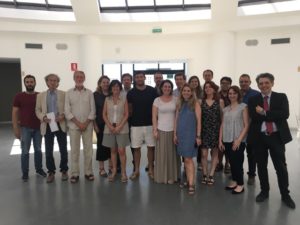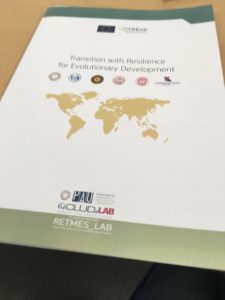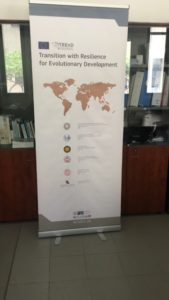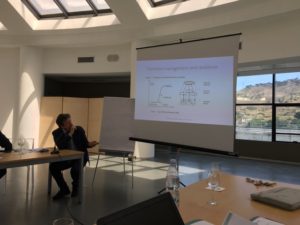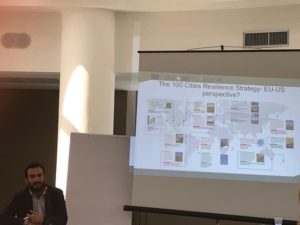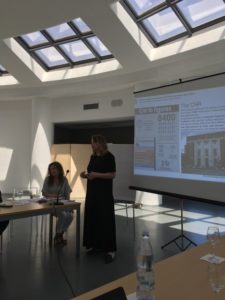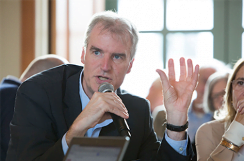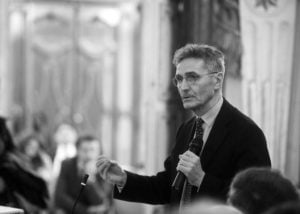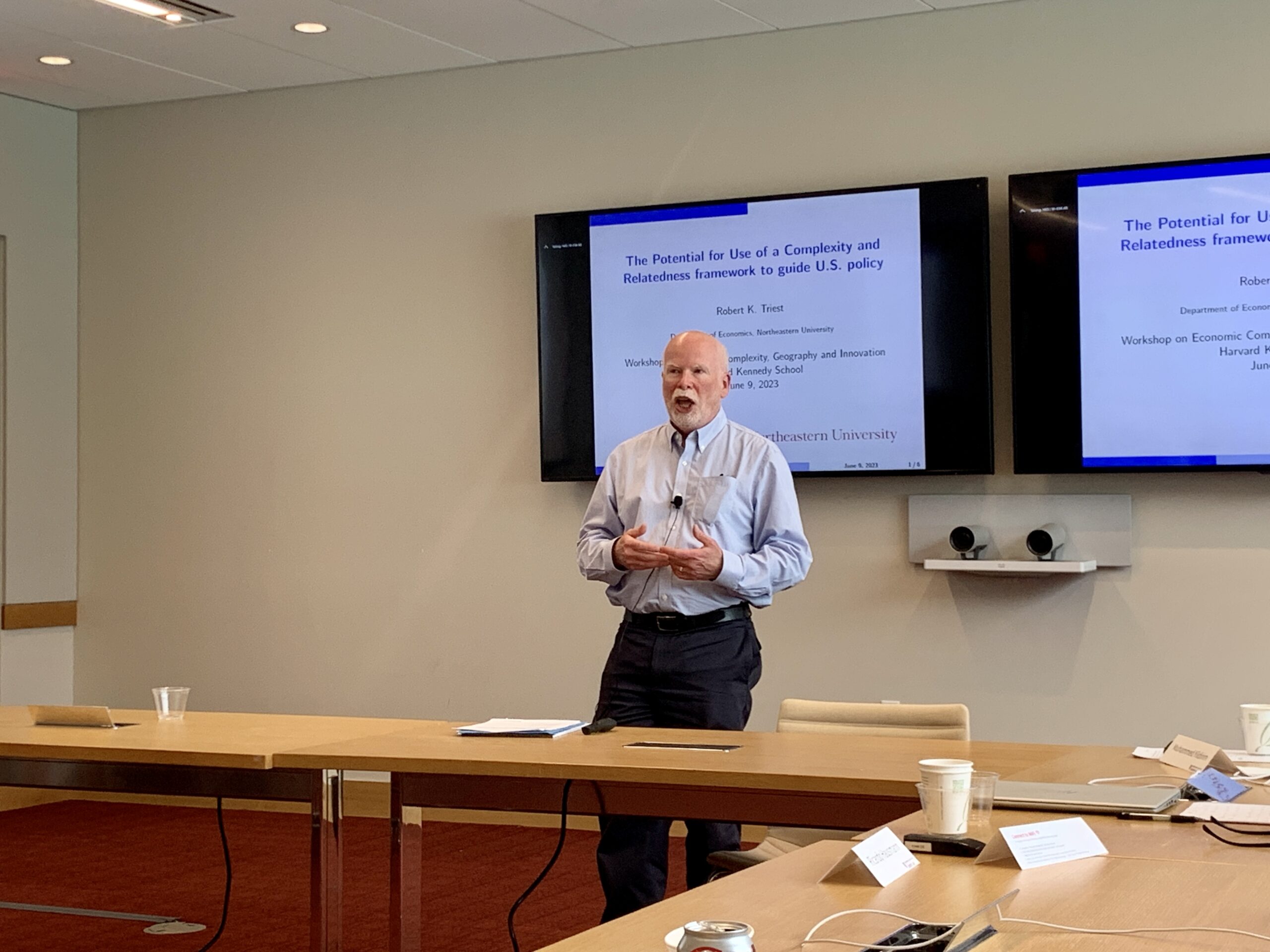
TREND Project – Workshop on Economic Complexity, Geography and Innovation. 9 June 2023 – Cambridge, MA. Harvard Kennedy School
June 2023
Workshop on Economic Complexity, Geography and Innovation. 9 June 2023 – Cambridge, MA. Harvard Kennedy School
![]()
The aim of the workshop was to bring together a group of scholars who have worked on areas related to economic complexity, geography and innovation. We hope that this will allow us to gain an understanding of the points of agreement and of disagreement, as well as determining the most important opportunities for future research & policy
implications.
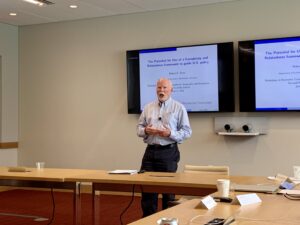
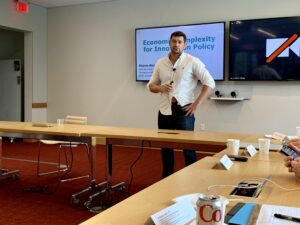
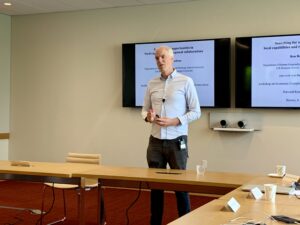
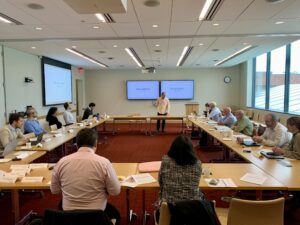
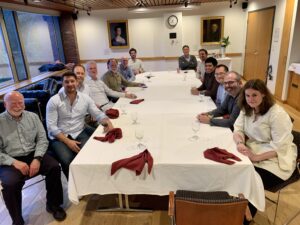
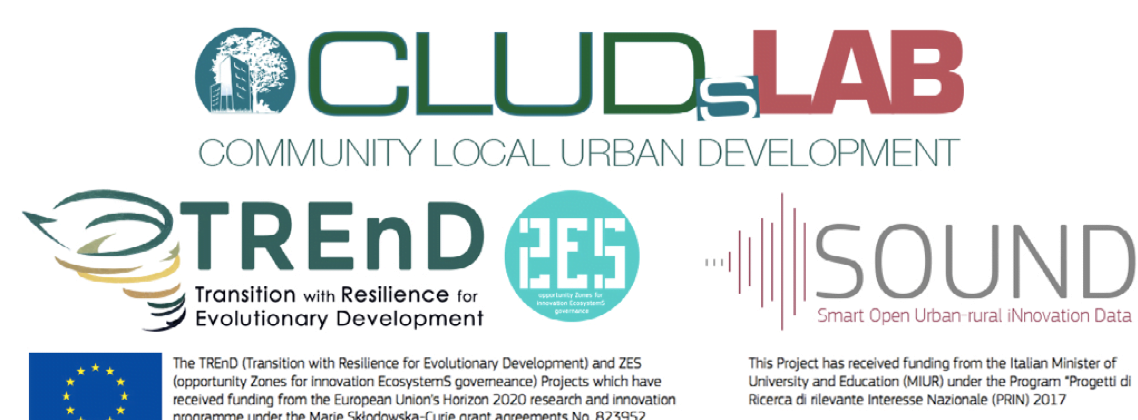
International Symposium NMP 2022 – Open Panel Discussion – MAARC Museum of Reggio Calabria 25th May 2022
Reggio Calabria, 25 May 2022
The Technological silent revolution and the global transitions: the Game Changer of metropolitan and peripheral areas perspectives
Carmelina Bevilacqua, TRenD Project Scientific Coordinator
Relatedness, Complexity, and Regional Inequality in Europe
Ron Boschma, Utrecht University
Global dynamics and territorial gaps: the contradictory role of Southern Italy
Francesca Moraci – Mediterranea University of Reggio Calabria
Territorial Cohesion in less developed regions: Questioning the effectiveness of Smart Specialisation policies
Jozsef Benedek – Babeș-Bolyai University and Miskolc University
The debate
The opening panel of the NMP Symposium 2022 introduces the debate on the role of metropolitan and peripheral areas in rebalancing the side effects of the silent technological revolution and the global transitions.
We are experiencing a period characterized by uncertainty and complexity. The recent events have shown how non-linear development trajectories will be the “new normal” in the following decades. In the globalized world, shocks and crises have severe consequences at the local level, shaping new urban/territorial development scenarios where socio-ecological and socio- technological transformations claim a collective awareness for valid actions.
For a long time, cities, metropolitan areas, and regions have attempted to address their social, economic, and environmental issues against a fast change due to the technological impulse, too speedy to be absorbed in the required time but with irreversible transformations of every aspect of modern daily life.
A silent revolution that brings out the territorial gaps in addressing social and environmental vulnerabilities. Climate changes side effects, globalization dynamics, industrial transition, innovation and digitalization, migration, social exclusion, the COVID outbreak, and the implications of the recent geopolitical events are questioning the equity distribution of well-being. Such challenges impact and affect places differently according to their contextual conditions demonstrating the urgency for addressing vulnerabilities and inequalities in the transition towards resilience and sustainability.
This 2022 edition of the NMP Symposium benefits of the synergic cross-linked research projects TREnD (Transition with Resilience for Evolutionary Development) and ZES (opportunity Zones for innovation EcosystemS governance) funded by the European Horizon2020 Program under the Marie Skłodowska Curie Actions – RISE and IF, and SOUND (Smart Open UrbaN- rural Data), funded by the Italian Ministry of Research under the PRIN Program.
Keynote speakers Bio
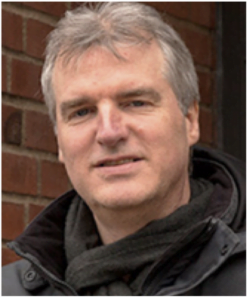
Ron Boschma is Full Professor in Regional Economics at the Department of Human Geography and Spatial Planning at Utrecht University. He also holds a Chair in Innovation Studies at the UiS Business School, Stavanger Centre for Innovation Research, at Stavanger University. In the period 2013-2015, Boschma has been director of the Centre for Innovation, Research and Competence in the Learning Economy (CIRCLE) at Lund University. He has widely published in international journals on Evolutionary Economic Geography, the spatial evolution
of industries, regional systems of innovation, the structure and evolution of networks, agglomeration externalities and regional growth. He has been one of the founders of Evolutionary Economic Geography, a new and expanding stream in Economic Geography. Boschma is member of Scientific Advisory group for European Commission DG Urban and Regional Policy, 2018-2020, member of the Board of the International Regional Studies Association since 2015, and he has been member of the Research, Innovation and Science Experts (RISE) High-Level Advisory Body to European Commissioner Carlos Moedas in the period 2015-2016. Boschma was ranked by Thomson Reuters among the top 1% of cited researchers worldwide in all scientific fields in 2014-2019.
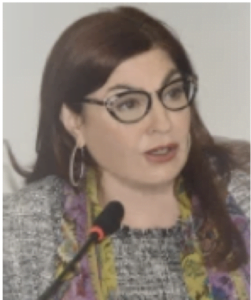
Francesca Moraci is Full Professor in Urban Planning at the University of Reggio Calabria. She was Visiting Professor at the Chongqin University (China) and at the ETSAV-UPC of Barcelona (Universitad de Catalunya). She has held institutional roles for the Ministry of Sustainable Infrastructure and Mobility (MIMS), FS Italiane Holding and ANAS. She was among the 15 MIMS experts for the National Strategic Plan for Ports and Logistics (port reform). In 2021, she has been appointed by the Ministry of Infrastructure and Sustainable Mobility Member of the Committee to reform the national legislation on land use planning, urban planning standards (public services) and public works. Since 2020, she is a member of the scientific committee of the Sustainable Infrastructure Association and a member of the permanent Observatory on Infrastructure, Transport and Logistics at EURISPES – Institute of Political, Economic and Social Studies. She promotes and coordinates the Mediterranea University reflection group on the „Crisis of the city: reasons, remedies, initiatives“, UN-MAE resolution along with the studies on ethics of the city. She is the designer of several city plans with attention to the link between urban welfare and governance. Over the years, her research projects have always taken account of the political reasons for the disparities within the city, and between regions, and studied the forces that make persistent disadvantaged conditions. She is the author of over 160 scientific publications, including monographs, journals articles and essays, as well as websites and other online publications.
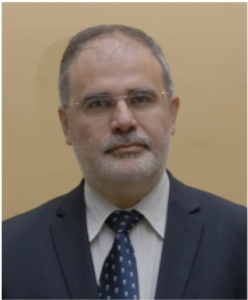
József Benedek is Professor of Human Geography at the Babeș-Bolyai University (BBU), Faculty of Geography, Cluj (Romania), and at the Faculty of Economics, Miskolc (Hungary). He is also Director of the Research Centre of Sustainable Development, Member of the Hungarian Academy of Science, Alexander von Humboldt Fellow, and New Europe College Fellow. His research interests fall into four major areas: regional economic development, sustainable development, geography of public policy. He is author of several publications on the topic of Smart Specialization Strategies in less developed regions, urban policy and regional development, EU Cohesion Policy and peripherialization.
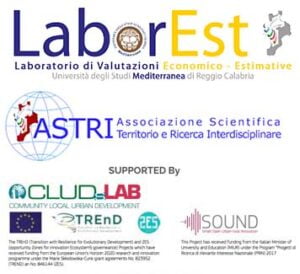
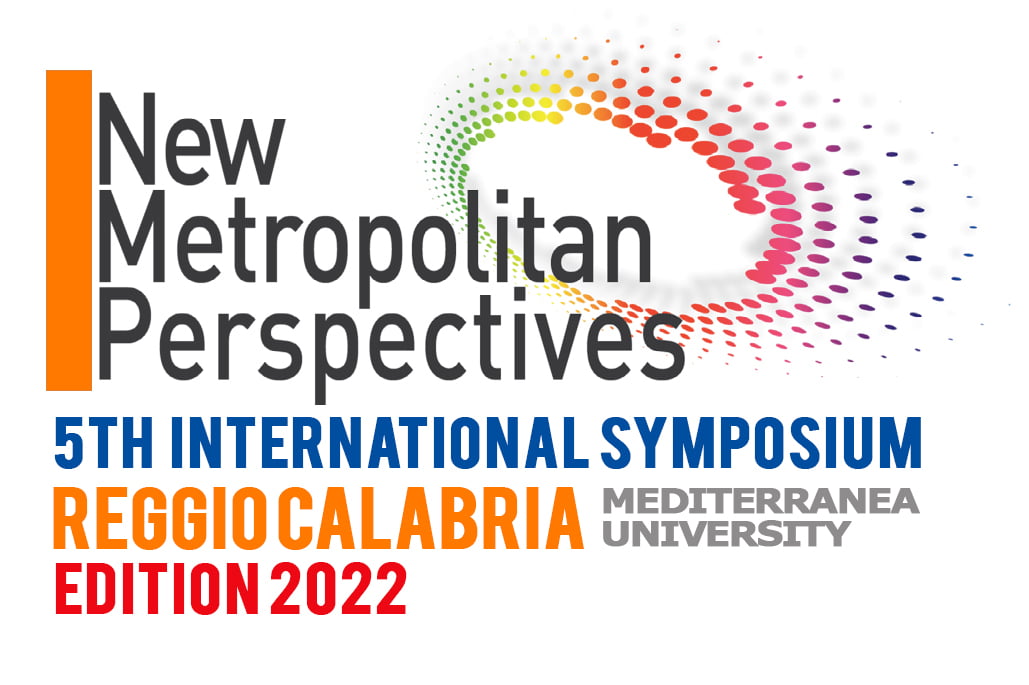
International Symposium New Metropolitan Perspective-NMP 2022
25-27 May 2022 Reggio Calabria, Italy
The New Metropolitan Perspective International Symposium 5th edition is promoted by the LaborEst, PAU Department, Università Mediterranea of Reggio Calabria, Italy, in partnership with a qualified international network of academic institutions and scientific societies.
The Symposium is supported by the CLUDs Laboratory of the PAU Department with the synergic cross-linked research projects TREnD (Transition with Resilience for Evolutionary Development) and ZES (opportunity Zones for innovation EcosystemS governance) funded by the European Horizon2020 Program under the Marie Skłodowska Curie Actions – RISE and IF, and SOUND (Smart Open UrbaN- rural Data), funded by the Italian Ministry of Research under the PRIN Program.
Accepted papers will be published in Lecture Notes in Networks and Systems – LNNS (2367-3370) by SPRINGER.
IMPORTANT DATES
October 1st, 2021 Session submission deadline
November 28th, 2021 Paper submission deadline
February 6th, 2022 Notification to authors
February 17th, 2022 Author Registration deadline
May 25th-27th, 2022 Symposium
More info about the Symposium, the call for session and the call for paper visit are available at http://www.nmp.unirc.it

EU Researchers Night 2020 SuperScienceMe – TREND and ZES Projects at the EU Corner – 27 November 2020
TREND and ZES Projects at the EU Corner of the SueperScienceMe – Researchers Night 2020
27 November 2020
The CLUDsLab TREnD (H2020-RISE) and ZES (H2020-IF) Research Projects will be at the EU Corner of the SuperScienceMe – Researchers Night 2020 event on the 27th November 2020.
The EU corner is aimed to promote the Marie Sklodowska Curie (MSCA) Actions hosted by the Universities and Research Institutes (CNR) partners of the event.
Both projects provide insights on the complexity of the urban and territorial systems towards the green and digital transition of EU by focusing on the ability of cities and territories to adapt to shock and stresses through knowledge and innovation dynamics, with the aim to contribute to the reform of the Cohesion Policy for the programming period 2021-2027.
Professor Carmelina Bevilacqua (Projects Coordinator) and Pasquale Pizzimenti (Marie-Curie Post-Doctoral Fellow) will participate to the event sharing their experience with prospects applicants to future MSCA actions.
The event is organized by the Calabria and Basilicata Universities, Research Institutes (CNR) and the Regional Administrations of the two Regions and founded by a Horizon 2020 Project (GA 955435).
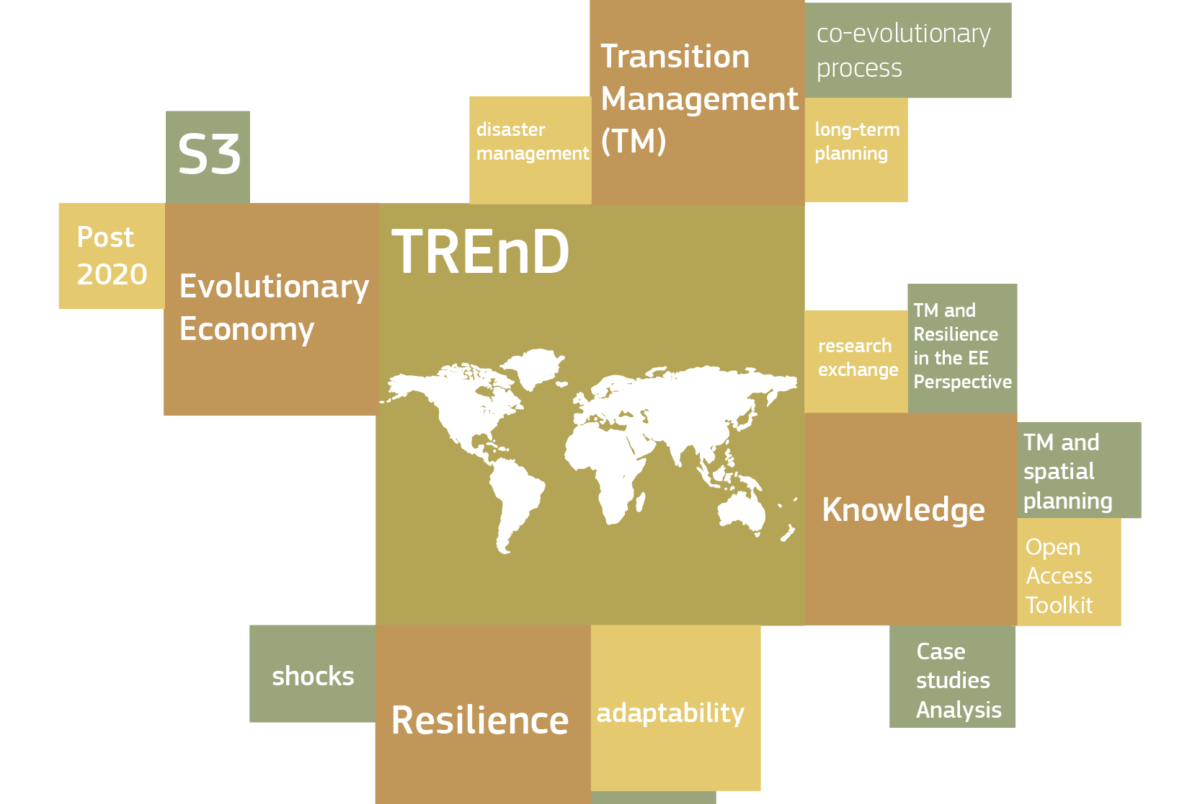
TREnD Project – Open Panel Discussion New Metropolitan Perspective Symposium 2020 – 26 May 2020
Reggio Calabria, IT – 26 May 2020
TREnD International Open Panel Discussion – New Metropolitan Perspectives 2020 – Opening Event
Equity in Diversity – inclusion in complexity: Knowledge complexity, inclusiveness and sustainability: Towards a transition agenda for Cohesion Policy
How to combine Smart, Inclusive and Green Growth. Towards a Transition Agenda for Cohesion Policy
Ron Boschma, Utrecht University
Rethinking Europe: challenges and transformations
Sergio Fabbrini, LUISS University, Harvard University – Kennedy School of Government
The debate: Technological resilience and inequalities dynamics, Can knowledge complexity generate inequalities? New trends for peripheral areas
Since the 1980s, the European Union has pursued the overall objective to strengthen the economic and social cohesion to reduce disparities among more and less developed regions through the Cohesion Policy. The introduction of Smart Specialisation Strategies (S3) in the Cohesion Policy agenda for the programming period 2014-2020 was aimed at the reduction of disparities by exploiting local assets and potentials through a strongly-oriented research and innovation agenda in line with Europe Strategy 2020. However, inequalities have become a growing phenomenon affecting advanced and lagging regions. According to a recent study on regional inequalities in Europe, delivered by European Parliamentary Research Service, “while aggregate disparities between the Member States are decreasing, there seems to be a growing spatial disconnect, with some regions growing dynamically and others stagnating or falling behind”. Moreover, the presence of the so-called “inner peripheries” in almost all European countries claims for a more inclusive and sustainable approach in the “transitional” phase towards the 2021-2027 Cohesion Policy. There is a common agreement that the rising of inequalities is urged mainly by technological change, disruption of organized labor and globalization, with the decline of the middle class and lower taxes on capital. The inequalities generated by knowledge and innovation dynamics, following the global market powers, are bringing both advanced and less developed areas to revise their development strategies improving their ability to respond to the shocks they are more frequently facing. Such a resilience-based process rests on the identification of the key vulnerability factors, to manage the transition phase claimed for more inclusive and sustainable development of EU regions.
The TREnD project proposes an integrated approach based on an evolutionary perspective in recognizing that the dynamic process, thanks to innovation and knowledge, defines different equilibrium paths that may be rather explained by the territorial response. The TREnD Project main objective is to stimulate the regional diversification to be seen more as a co-creation of solutions and concepts on development problems through. enhancing the resilient capacity of regions; applying a transitional approach to tailored placed-based innovation policies. The approach moves from the general question of how strengthening the regional capabilities in triggering, implementing and managing Transition strategies towards driving “resilience-building” processes.
Keynotes Bio
Ron Boschma – Utrecht University
Ron Boschma is Full Professor in Regional Economics at the Department of Human Geography and Planning at the Faculty of Geosciences, University of Utrecht. He is also Professor 2 at UiS Business School of Stavanger University, Norway since 2017. In the period 2013-2015, Boschma has been director of the Centre for Innovation, Research and Competence in the Learning Economy (CIRCLE) at Lund University. Boschma has published in international journals on Evolutionary Economic Geography, the spatial evolution of industries, geography of innovation, regional resilience, the structure and evolution of spatial networks, agglomeration externalities, and regional diversification. He has been one of the founders of Evolutionary Economic Geography, a new and expanding stream in Economic Geography. Boschma is member of Scientific Advisory group for European Commission DG Urban and Regional Policy, 2018-2020, member of the Board of the International Regional Studies Association since 2015, and he has been member of the Research, Innovation and Science Experts (RISE) High-Level Advisory Body to European Commissioner Carlos Moedas in the period 2015-2016. Boschma was ranked by Thomson Reuters among the top 1% of cited researchers worldwide in all scientific fields in 2014-2019.
Sergio Fabbrini – LUISS University, Harvard University Kennedy School of Government
Sergio Fabbrini is currently Professor of Political Science and International Relations and Dean of the Political Science Department at the Luiss Guido Carli in Rome. He is currently the Pirre Keller Visiting Professor at the Harvard Kennedy School of Government. He founded and directed the Luiss School of Government from 2009 to 2018. He served as Director of the Trento School of International Studies in the period 2006-2009 and Editor of the “Italian Journal of Political Science” in the period 2004-2009, the first Editor after Giovanni Sartori who founded it. He was Recurrent Visiting Professor of Comparative and International Politics at the Department of Political Science and Institute of Governmental Studies, University of California at Berkeley; Jemolo Fellow at the Nuffield College, Oxford University; Jean Monnet Chair Professor at the Robert Schuman Center for Advanced Studies, European University Institute in Florence and Visiting Professor in the Department of Political and Social Sciences, European University Institute in Florence; Fulbright Scholar at the Department of Government, Harvard University. He lectured, among others, in Canada (Carlton University), in Mexico (El Colegio de México, Mexico City), in Argentina (Universitad de Buenos Aires and Universitad Abierta Interamericana), in Ecuador (Quito Simon Bolivar University), in China (Nanjing University), in Japan (Osaka University, Tokyo Imperial University and Sapporo University), in Thailand (Chulalongkorn University, Bangkok), in the Philippines (University of Philippines-Diliman, Manila) and in several European universities. He won the 2011 “Capalbio Prize for Europe”, the 2009 “Filippo Burzio Prize for the Political Sciences” and the 2006 “Amalfi European Prize for the Social Sciences”. He was member of the Steering Committee of the European Consortium for Political Research (ECPR) Standing Group on European Union. He published ninenteen books, two co-authored books and twenty edited or co-edited books or journals’ special issues, and several hundred scientific articles and essays in seven languages in the most important peer-reviewed international journals. His publications in English include: Europe’s Future: Decoupling and Reforming, Cambridge, Cambridge University Press, 2019; Which European Union? Europe After the Euro Crisis, Cambridge, Cambridge University Press, 2015;Compound Democracies: Why the United States and Europe Are Becoming Similar, Oxford, Oxford University Press, 2010 (second and revised edition); America and Its Critics: Vices and Virtues of the Democratic Hyperpower, Cambridge, Polity Press, 2008; Italy in the European Union. Redefining National Interest in a Compound Polity (with Simona Piattoni, eds.), Lanham, Md, Rowman and Littlefield, 2007; The United States Contested. American Unilateralism and European Dissent (ed.), London, Routledge, 2006; Federalism and Democracy in the European Union and the United States. Exploring Post-National Governance (ed.), London, Routledge, 2005; Italy Between Europeanization and Domestic Politics (with V. Della Sala, eds), New York, N.Y. Oxford, Berghahn, 2004. He is political editor for the Italian financial daily Il Sole 24 Ore. He received the 2017 Spinelli Prize for his editorials.
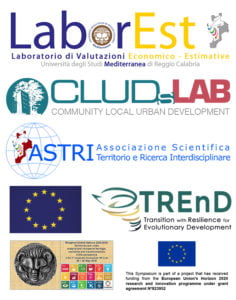
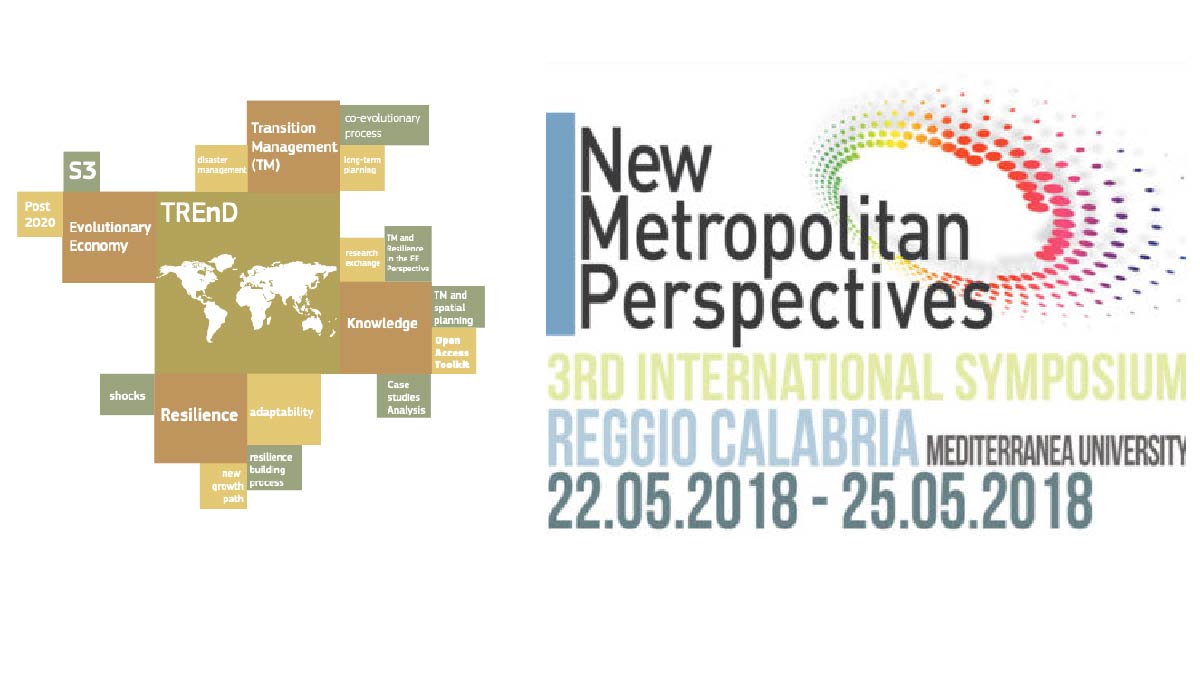
TREnD Project – New Metropolitan Perspective Symposium 2020 – 25-28 May 2020
The Symposium will take place in Reggio Calabria (Italy) from 26 to 28 May, 2020.
The 4th edition of the International Symposium “New Metropolitan Perspectives” faces the challenge of local development’s innovation dynamics and its complexity putting humankind at the centre of the scientific debate, towards reclaiming that “man is the measure of all things”.
In partnership with Rhegion United Nations 2020-2030. Territories and cities, material and immaterial heritage, resilience and transformations in the perspective of the 17 Sustainable Development UN Goals.
The symposium is jointly promoted by the LaborEst and the CLUDsLab Laboratories of the PAU Department, Università Mediterranea of Reggio Calabria, Italy, in partnership with a qualified international network of academic institutions and scientific societies.
It is part of the TREnD (Transition with Resilience for Evolutionary Economic Development) Research Project funded by the European Union’s Horizon 2020 Research and Innovation Programme under the Marie Skłodowska Curie Actions – RISE 2018.
Accepted papers will be published in Smart Innovation, System and Technologies (2190-3018) by SPRINGER. The books of this series are submitted to SCOPUS, EI-Compendex and Springerlink.
Organizing Committee


TREnD Project – First Assessment Meeting
October, 2019 – Boston (MA)
The TREnd First Assessment Meeting took place in Boston the 8th and 9th of October as scheduled after the Kick-Off meeting of the Project in Reggio Calabria. According with the Agenda the meeting was articulated in a two days session. The first day session centered on the research activities to carry on during the 1st WP in Boston and the second day session centered on the projects’ activities operative implementation and management aspects.
The first day session focused on the need to define an operative framework in order to facilitate the research activities to conduct in Boston by all the partners during the 1st WP of the TREnD Project.
The session was welcomed by Professor Robert Triest, Chair of the Northeastern Department of Economics. Based on his previous experience at the Federal Reserve of Boston on the topic of regional inequalities, his introduction focused on the historical “resilience” ability of Boston – and of Massachussets in general – to adapt to several shocks across time. In particular, the city of Boston, has shown in the last decades a high level degree of adaptability during the different socio-economic transition phases caused by national or local shocks. Each transition phase was characterized by the re-organization and re-design of development strategies. One of the clearest example reported concerned the Boston area education system. The current innovation ecosystem is the result of a long lasting process started with the need to have a highly skilled labour force for the industrial sector. It was the chance for the educational system to re-organize and offer technical-based programs attracting students from the entire state.
The discussion on the Boston and Massachussets resilience-centered ability to adapt to the different shocks resulted inspiring for the TREnD research activities framework definition, both for the study of last decades shocks’ identification and for the definition of a preliminary list of case studies to investigate starting from January. A preliminary desk research confirmed how the State of Massachussets has developed a Resilience State-wide Program with specific actions and specific tools to adopt. The cities above-mentioned have adopted resilience-based strategies with different aims and actions to undertake accordingly with their specific context situation. This material could result helpful for the definition of the cases’ selection criteria and the selection of case studies to analyze during the first WP in Boston according with each units’ research topics to investigate.
The Second day of the First Assessment meeting was dedicated to definition of the research activities framework to develop in Boston during the WP1 and to the management of the related secondments including the financial aspects.
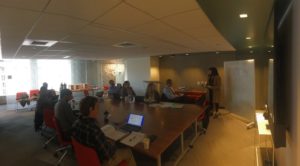


Geography of Innovation and Complexity – TREnD Project
September 5th, 2019 – Utrecht (Netherlands)
The TREnD First International Workshop is the second milestone (MS2) of the TREnD project. It took place during the Conference on the Geography of Innovation & Complexity (GIC), hosted by Utrecht University (UU, partner of the TREnD project) between the 2nd and 5th of September 2019, as scheduled during TREnD Kick-Off meeting in Reggio Calabria.
The aim of the meeting was defining the operative framework for the research activities to conduct in Boston during the 1st WP of the TREnD Project. The framework rests on the overall objective to reduce the gap between EU excellences and EU disparities by empowering the linkage between R&I and Cohesion Policies, namely Smart Specialisation Strategies, Horizon 2020 and Cohesion Policy.
Today, the challenge for the EU is how to sustain the prosperity of the core city/regions driving the EU economy and at the same reduce the gap between them and the less developed areas.

This challenge implies two considerations that match the research objective and the activities envisaged by the TREnD project. The first, relates to the Resilience/Transition Management/Evolutionary Economy perspective. Regions and cities’ ability to adapt and respond to external shocks and their ability to manage the transition are crucial for a more inclusive development trajectory. The second, relates with the need to promote and empower a different regional – and sub-regional – development based on the place-sensitive approach that merges the people-based and place-based approaches into a new vision aimed at empower Distributed Development Strategies where economic development strategies need to be adaptive and to maximise the diversity of people, firms and places involved.
Complexity workshop: https://complexity.world
Complexity workshop key lessons: https://medium.com/@tabea.sonnenschein/key-lessons-from-the-gic-2019-8ae3da45e0ef

TREnD Project Kickoff Meeting
June 24th/25th, 2019 – Reggio Calabria (Italy)
The Kick off meeting of TREnD PROJECT took place on June 24th and 25th, hosted by the Università Mediterranea of Reggio Calabria, Italy.
The Kick-off Meeting of TREnD allowed the knowledge transfer among partners, to facilitate the collaboration and knowledge sharing, information transfer, and ongoing results for a future uptake and to support building a better integrated approach in case studies selection.
The meeting aimed at facilitating the collaboration and knowledge sharing among project partners, both beneficiaries and Third Country (TC) academic organisation, and at creating synergies for effective project implementation. All project partners worked to identify common ground for collaboration, according with a multidisciplinary approach.
